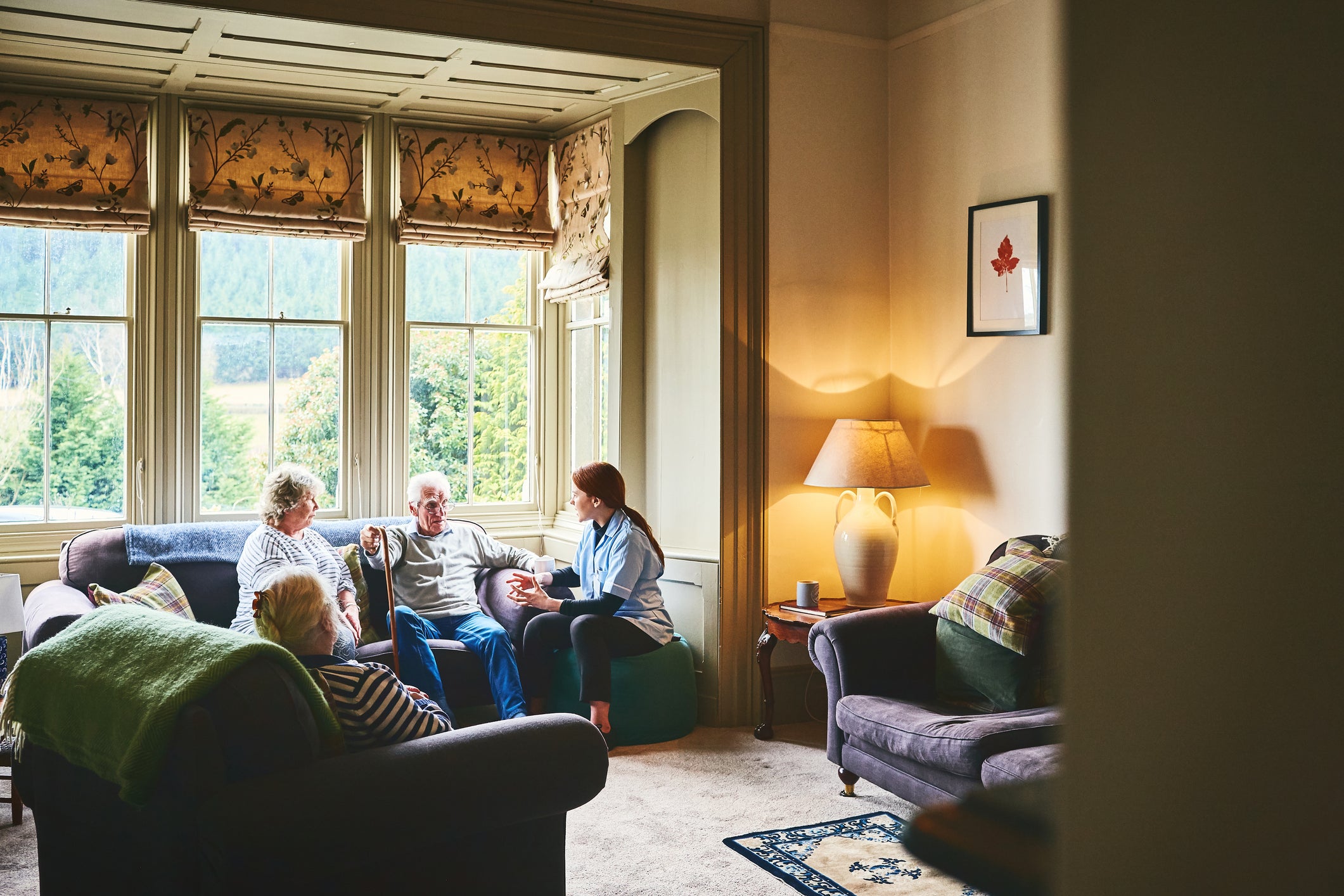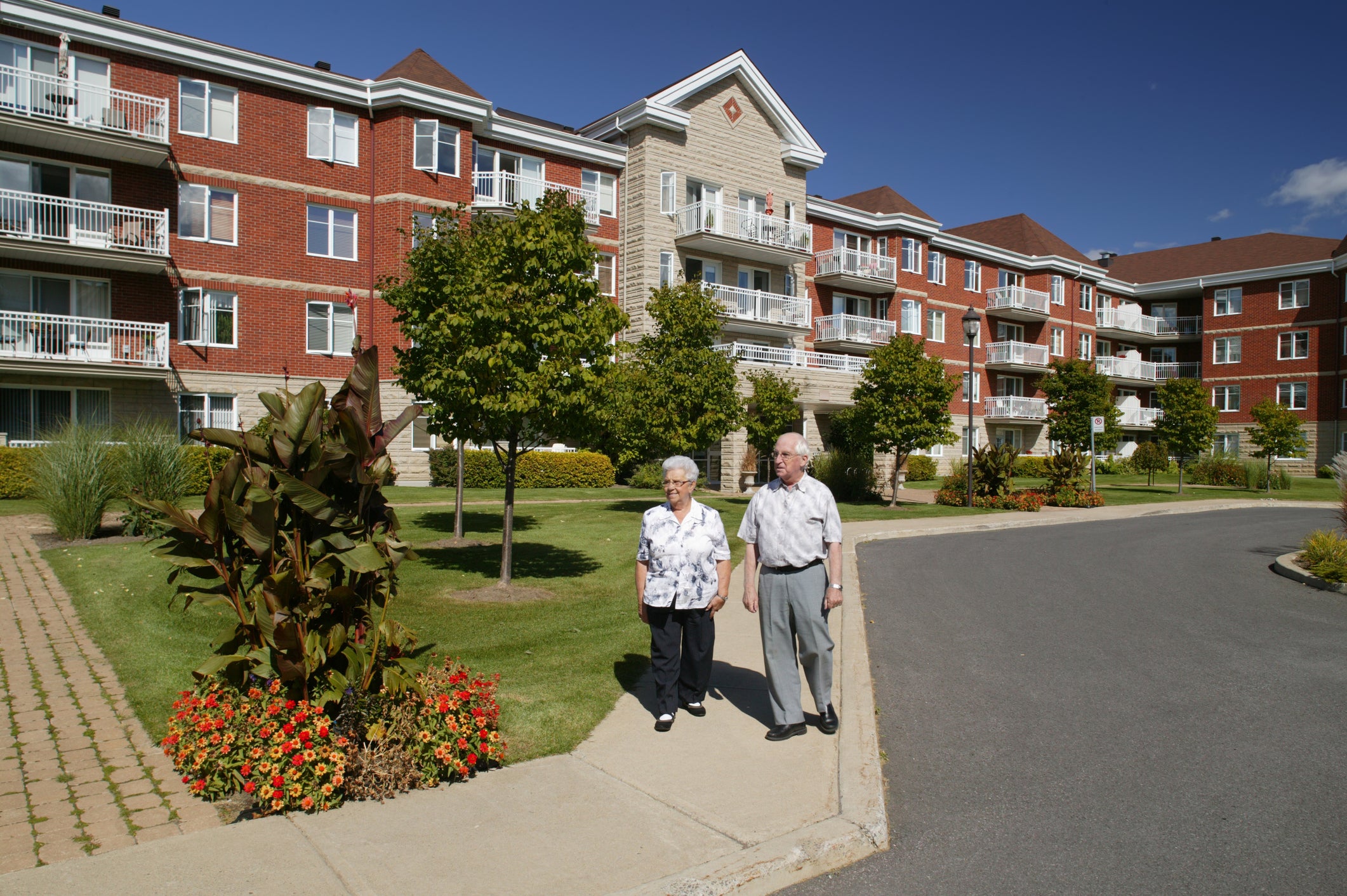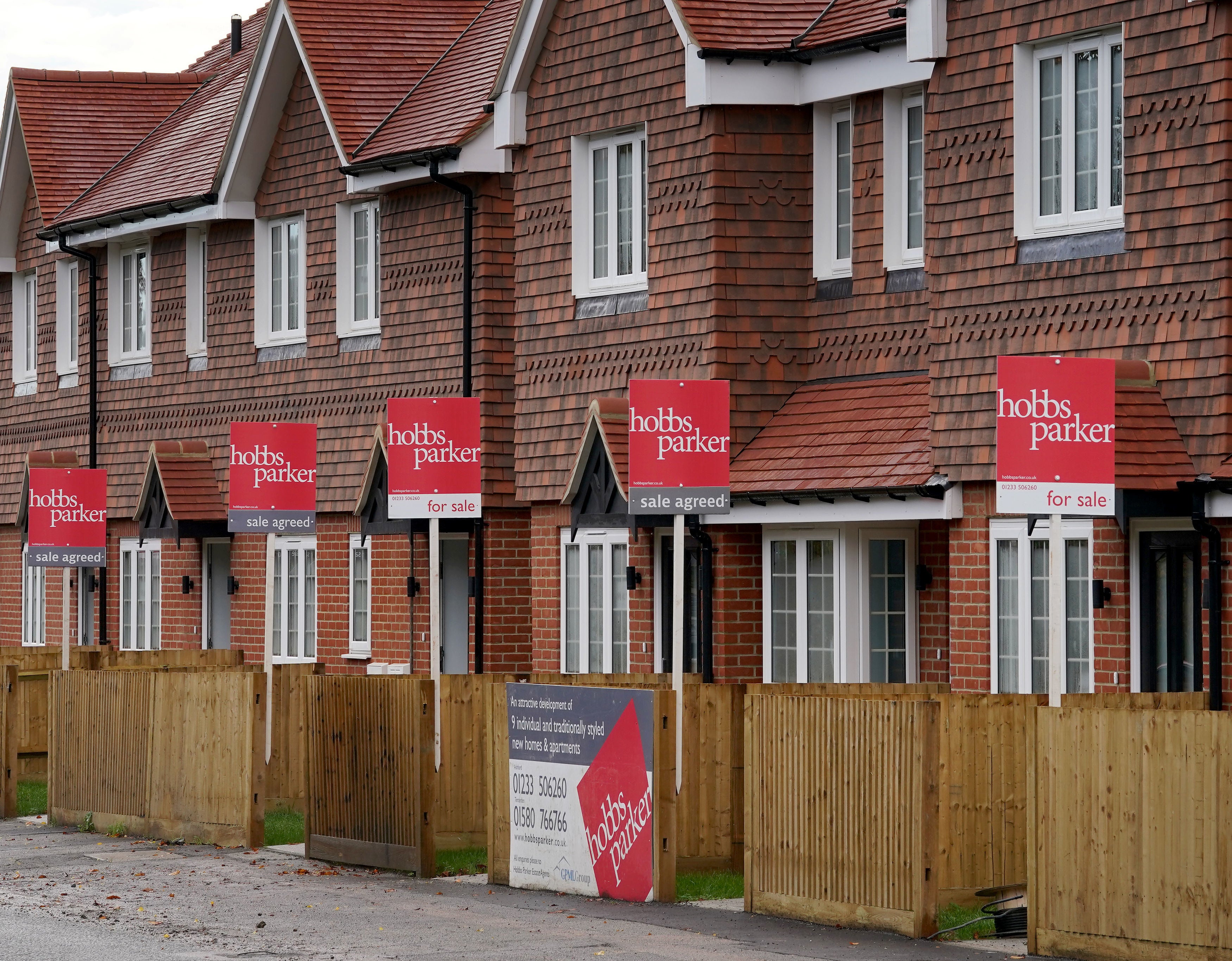Why aren’t older people downsizing to smaller homes?
As long as older people hold on to houses that are bigger than they need, there is a knock-on effect not just on the rest of the housing market, but on the wellbeing of those who wish to stay put, writes Hannah Fearn


About six years ago, my parents decided to sell the family home and move house. They were by this point well into their sixties, and were searching for a new property that would, in all likelihood, be their final marital home. A priority for them was to be somewhere closer to me and my husband – grandchildren were forthcoming – but also somewhere to enjoy retirement. They sold a four-bedroom house and bought... a five-bedroom house.
This is the problem with downsizing: the people who would benefit most simply don’t want to do it.
A decade ago, a high-profile group of MPs chaired by Lord Best carried out an inquiry into downsizing and retirement housing, seeking ways to free up larger family homes and prevent overcrowding elsewhere in the housing market. The group heard evidence from experts and researchers showing that moving into a smaller home in mid-life, rather than at a point of crisis in later life, has more than just financial benefits. It can improve long-term health and wellbeing, and even contribute to longevity. Lord Best even proposed a Help to Buy-style scheme to support the over-60s to find more suitable housing, and a stamp duty cut as a direct financial incentive to downsize.
But it didn’t work. In fact, over the last 10 years, the housing market has become more static than ever, with housing wealth building up steadily for those who are sitting in one place. More than half (54 per cent) of the UK’s homeowners own their properties outright, having long ago paid off the mortgage, and, unlike the US, the UK doesn’t have a successful model of the retirement village. Owners are staying put in properties that are often unsuited to their needs, leaving those properties both financially and very practically out of reach for younger families who desire more space.
When I challenged my father over what seemed to me an illogical decision, he said: “I’ve worked all my life for a house like this, and now I get to enjoy it.” How do you argue with an emotion like that?
A survey of attitudes by law firm Shakespeare Martineau found that he’s not alone. It calculated that 59 per cent of people aged over 50, across all housing tenures, either had no plan or didn’t know whether they planned to downsize in the future.
The problem is a significant one, not only for families but for public services, too. In an article for Inside Housing magazine, Louise Drew, a partner at the firm, set out the issue: “The Office for National Statistics’ latest figures show that the healthy life expectancy – the average number of years that an individual is expected to live in a state of self-assessed good or very good health – is 62.8 years. Our research showed that, on average, over-50s do not plan on moving into a right-sized property until they are 70.6 years old,” she wrote. That’s a significant gap.
She concluded: “People’s reluctance to right-size into a property that better suits their needs before a health crisis hits is a twofold issue for society. Not only is it having an impact on the NHS and social care crisis, in that more people are living in unsuitable homes that may have a negative impact on their health, but it is also having a severe knock-on effect on the housing crisis, as more young families are living in cramped accommodation.”
But something is shifting. Suddenly, attitudes are starting to change. The cost of living crisis is forcing families to have the conversations they had previously resisted, according to estate agents. This is most evident at the very top of the market, with mortgage-free owners of large and glamorous properties questioning whether it is financially prudent to keep up with the maintenance and energy bills that they generate.
Richard Winter, a buying agent working in the Surrey Hills, says he’s had calls from old clients who last bought more than 20 years ago, wondering whether he might have a possible buyer for their home. “They want to get some really trusted advice on whether it’s a good time to downsize,” he explains. “If they bought a house with swimming pools or tennis courts, they literally want to know the cost of that swimming pool at the moment. The children have left home, and the fact is they’re not using it. It’s pointless and it’s going to cost them a fortune every year.”
The lack of housing supply has been an important driver of ever-rising house prices, and a rush of downsizers will free up new properties
Winter says it’s not just potential downsizers making that call, but their children. “Families are quite proactive about making it happen. It’s the family saying ‘this is crazy’, because the bills are going through the roof and some of these big houses are not well insulated.”
Extensive evidence shows that high-quality housing – which includes housing that is the right size for its occupants – is a strong determinant of good mental as well as physical health. A report from the World Green Building Council found that, alongside light and good design, housing that was adaptable to later life was a crucial factor in comfort at home, and that this should be a principal factor in the design of modern housing. It said: “It is important to improve the quality of life of our ageing population, and those suffering from disability or illness. Being forced to move home or into care can result in increased loneliness.”
It is a huge argument in favour of early downsizing that most of our existing housing stock was not built with these factors in mind – a fact that many under-occupiers in later life are now starting to realise.
Winter serves the wealthiest homeowners, but the ripple effect of older owners choosing to move will be felt throughout the housing market. The lack of housing supply has been an important driver of ever-rising house prices, and a rush of downsizers (alongside buy-to-let landlords choosing to exit the market because of spiralling mortgage costs) will free up new properties.
Michelle Hendrie, a West Sussex buying agent, is witnessing the same pressure on older people to make difficult but practical decisions about housing now, particularly as house prices are expected to remain stagnant or drop for the foreseeable future. “Their children are now trying to persuade them to downsize because, although they would have done renovations 35-40 years ago, they’ve probably done very little since, so [the properties] now need to be brought up to date because they’re not energy efficient. The families are saying ‘You don’t need all this, you don’t want the hassle of having to do the work.’ They’re seeing that their parents could have an improved lifestyle if they downsized.”

Given the high average house price in many areas of the country, they are almost certainly aware that freeing up money trapped in housing equity might help them step onto (or find the next rung on) the housing ladder, too. What they may not have bargained for is that, in a tough economy, they will end up competing with their parents for the same mid-size homes – and losing out. As Hendrie explains: “Downsizers are very appealing to vendors because they don’t need a mortgage, so it’s a good time for downsizers because they are seen as good buyers, and there are a lot of buyers out there for these properties.”
Surprisingly, there are similar dynamics at play within the social housing market (which does operate as a market, too, albeit a controlled one). Housing policy experts and housing association leaders have been aware for decades that properties for social rent are not well distributed or allocated directly by need; just like owner-occupiers, families whose children have left home and are now under-occupying their properties often resist moving to another, cheaper home, for practical as well as emotional reasons. For families already struggling financially, the cost of moving house may in itself be a barrier.
Just like private housing sales, movement within the housing sector has also slowed to a crawl over the last decade. Only 10 per cent of social housing tenants are currently bidding on other properties to downsize, despite the obvious financial benefits of doing so. The churn within social housing overall has halved since 2012.
In the last decade, efforts to create a market inside social housing, which started with a series of punitive policy measures – including the imposition of the bedroom tax – have failed.
New developments alone will do little to release pressure on the housing sector – or to normalise downsizing, whether for financial or wellbeing reasons
After two years in practice, the government carried out an evaluation of the policy. According to Bekah Ryder, research lead at the National Housing Federation, the evaluation “found little evidence of [the bedroom tax] leading to increased employment, and though it did lead to an increase in downsizing, this was still less than 10 per cent of affected households by 2014”.
So those stubborn barriers still seemed to be in place, but now there is also a penalty for staying put, even when moving is impractical – and a cruel one at that, given rising household costs. Ryder says: “We have repeatedly requested [the Department for Work and Pensions] review or remove [the tax], including most recently requesting they remove it to help with the cost of living crisis.”
While the government appears to have given up, there is renewed interest from social housing providers in ways to encourage downsizing. Aware that they need to act in the face of rising energy bills, more effort is going into how to move people into homes that suit their needs better. It’s even been given a rebrand, designed to appeal to older tenants – “right-sizing”.
Louise Drew, partner at Shakespeare Martineau, is among those using this term to encourage housing associations and councils to work with developers to change how people think and speak about housing for “later life”.

Leo Pollak, a researcher in housing and a local councillor in south London, has also witnessed this push for a change in culture and attitudes to get away from the classic idea of retirement housing, where “you sit and mulch away in a collective living room: God’s waiting room. There’s a real effort from some people to create a much more energised and attractive form of older people’s housing.”
But new developments alone will do little to release pressure on the housing sector – or to normalise downsizing, whether for financial or wellbeing reasons. With a huge housing waiting list, new properties themselves do not encourage the sort of further movement that would release other homes and bedrooms. As Pollak puts it: “The point of building social housing is to rehouse people in housing need, so if you’ve got only chains of one – a person coming out of temporary accommodation – but you’re leaving other people in unsuitable housing where they are, then you’re not getting much bang in the buck.”
Pollak’s latest research looked at how to create chains just like you see in the open property market, but within social housing, by way of the exchange of tenancies. Achieving this, he calculates, would achieve “between a 50 to 150 per cent improvement in the numbers of households being rehoused from chains emanating from new supply”, without discriminating against those who are entering social housing for the first time, such as homeless households.
He concludes that tangible financial incentives are now necessary to get things moving – handouts that actually save the state money in the long run. In Brent, the council is offering a £5,000 bung for every bedroom a tenant releases by choosing to downsize to a smaller property. Pollak believes that councils need to think bigger and pay more. “If you’re incentivising a couple moving out of a five-bed... well, if you compare that [handout] to the cost of building new homes, it’s very economical.”
Whether private or social, the decision to move home is always an emotionally fraught one. Housing policy experts have spent decades working on an issue that sometimes seems immovable. As Putney estate agent Allan Fuller says, the decision to move to a smaller house is always “a question of when that practicality issue really becomes overriding”. In this economy, that threshold is now lowering fast – with everyone set to benefit. Perhaps even my dad will be having a rethink.




Join our commenting forum
Join thought-provoking conversations, follow other Independent readers and see their replies
Comments